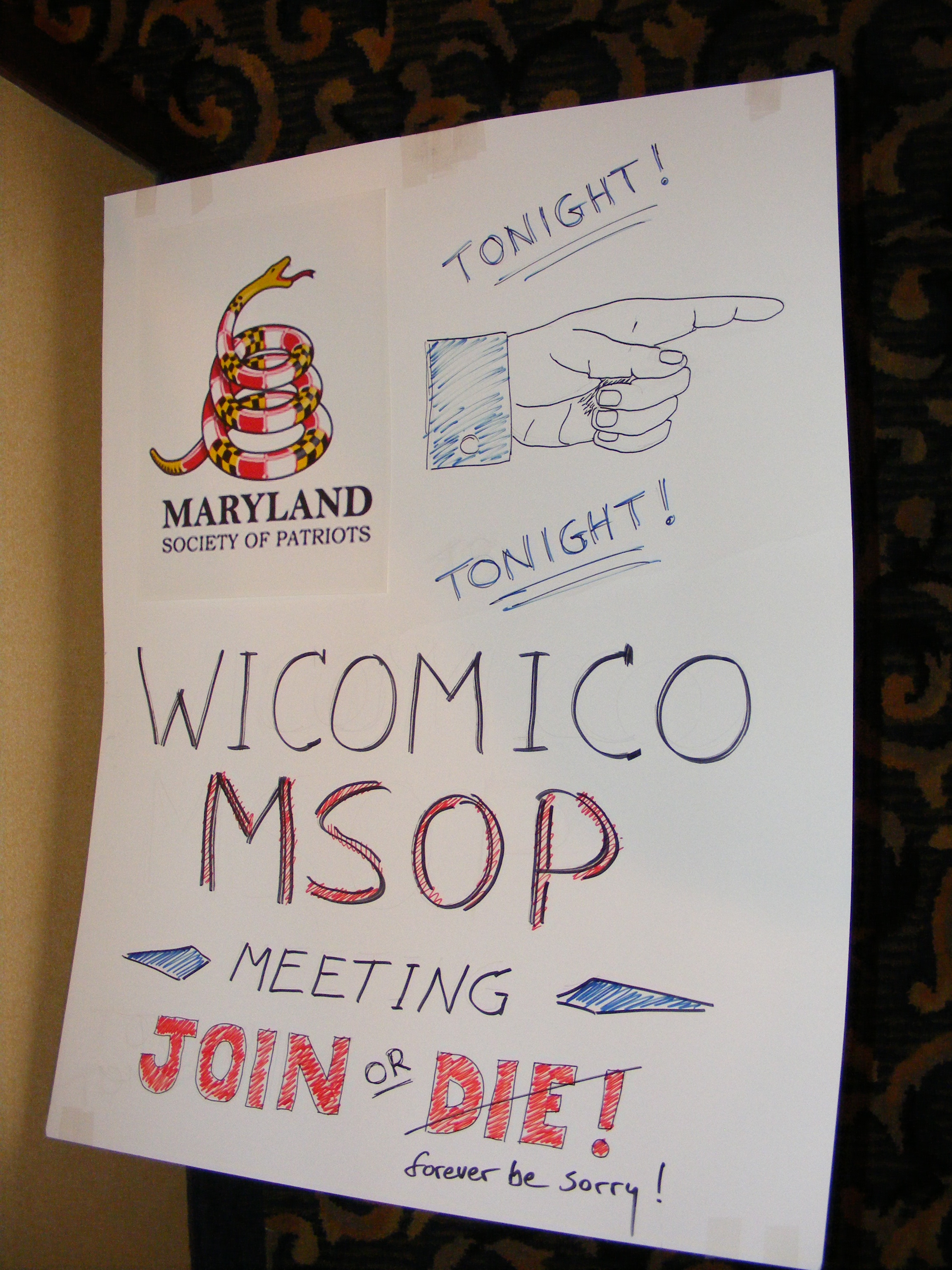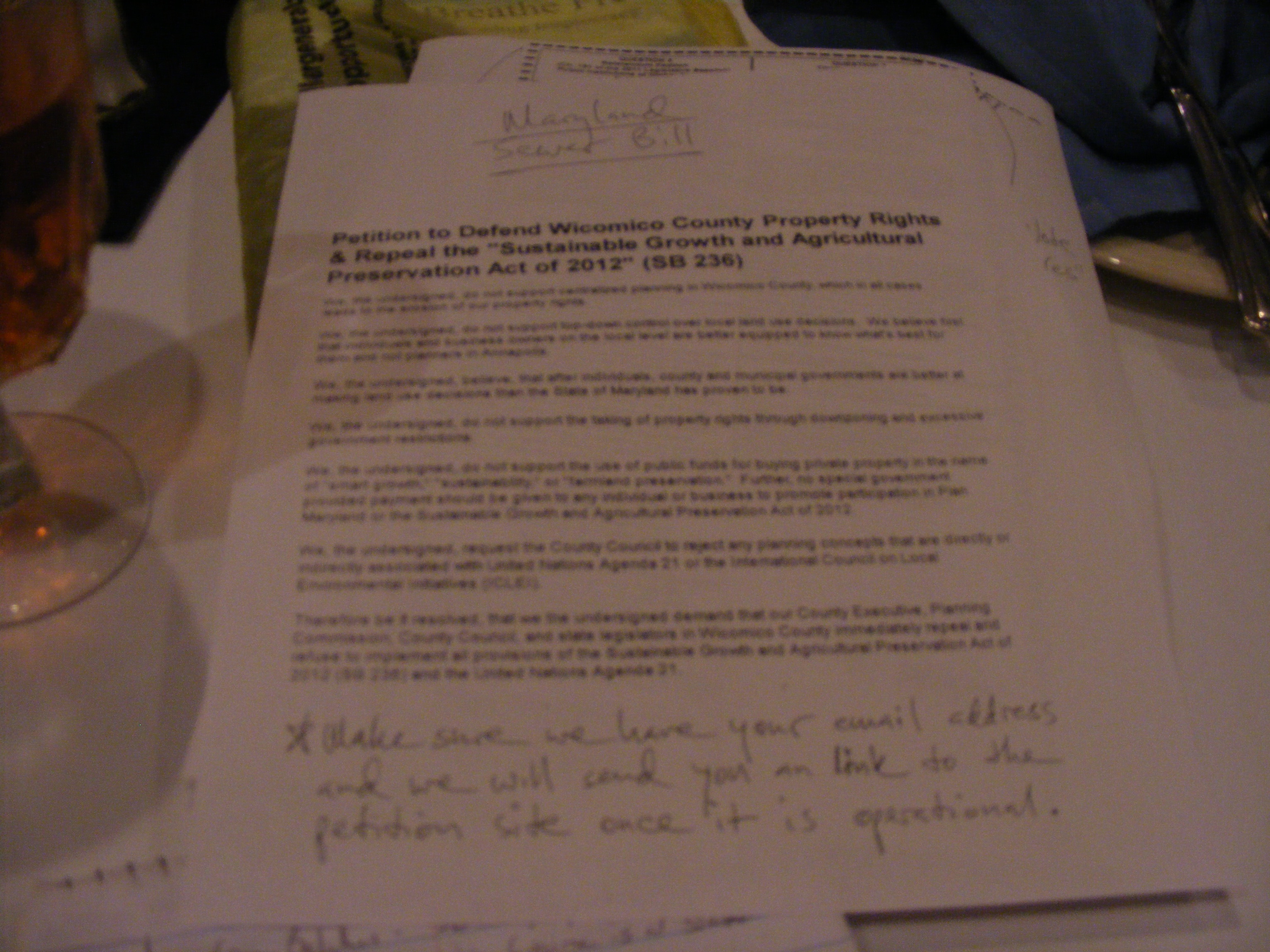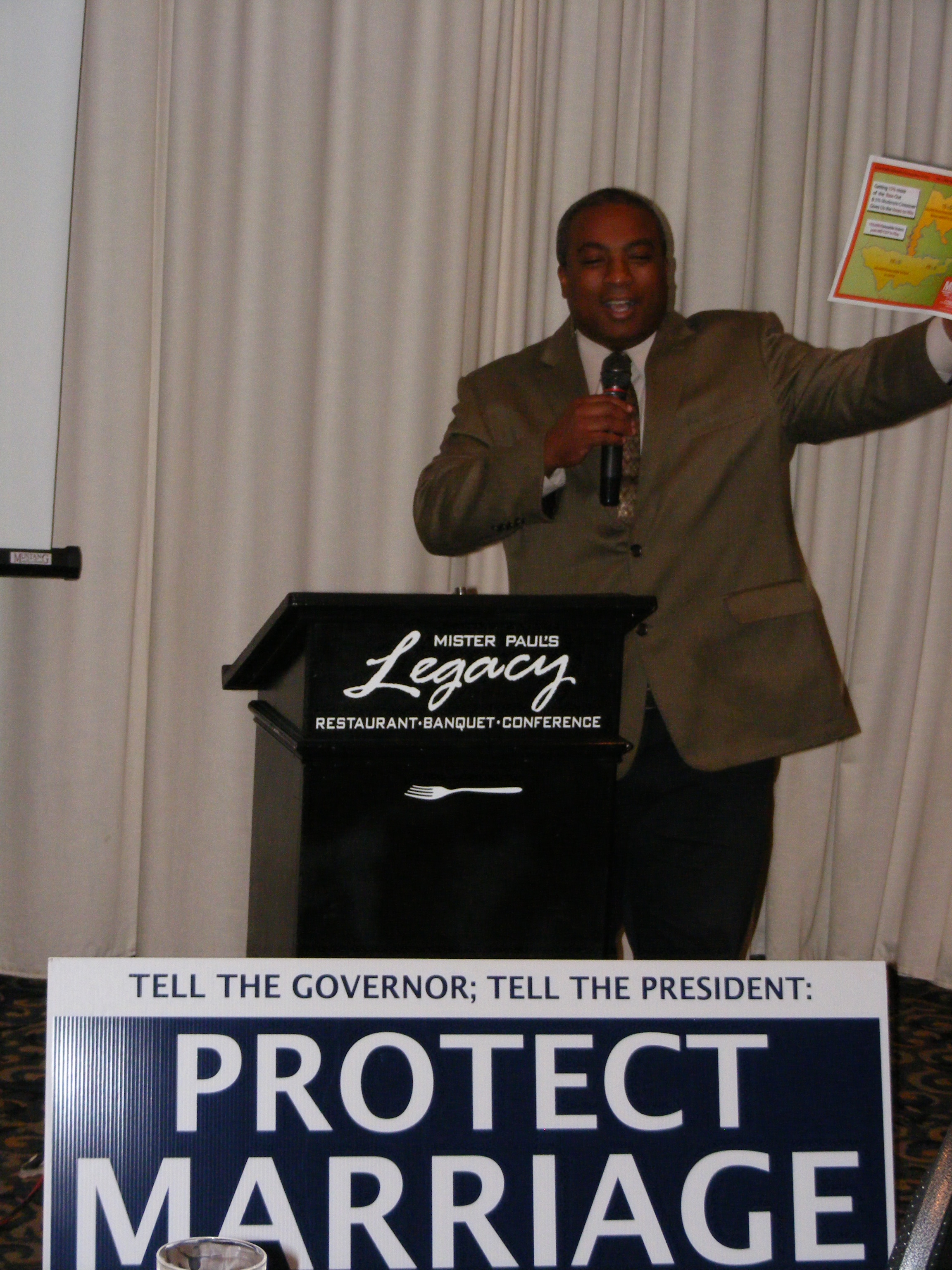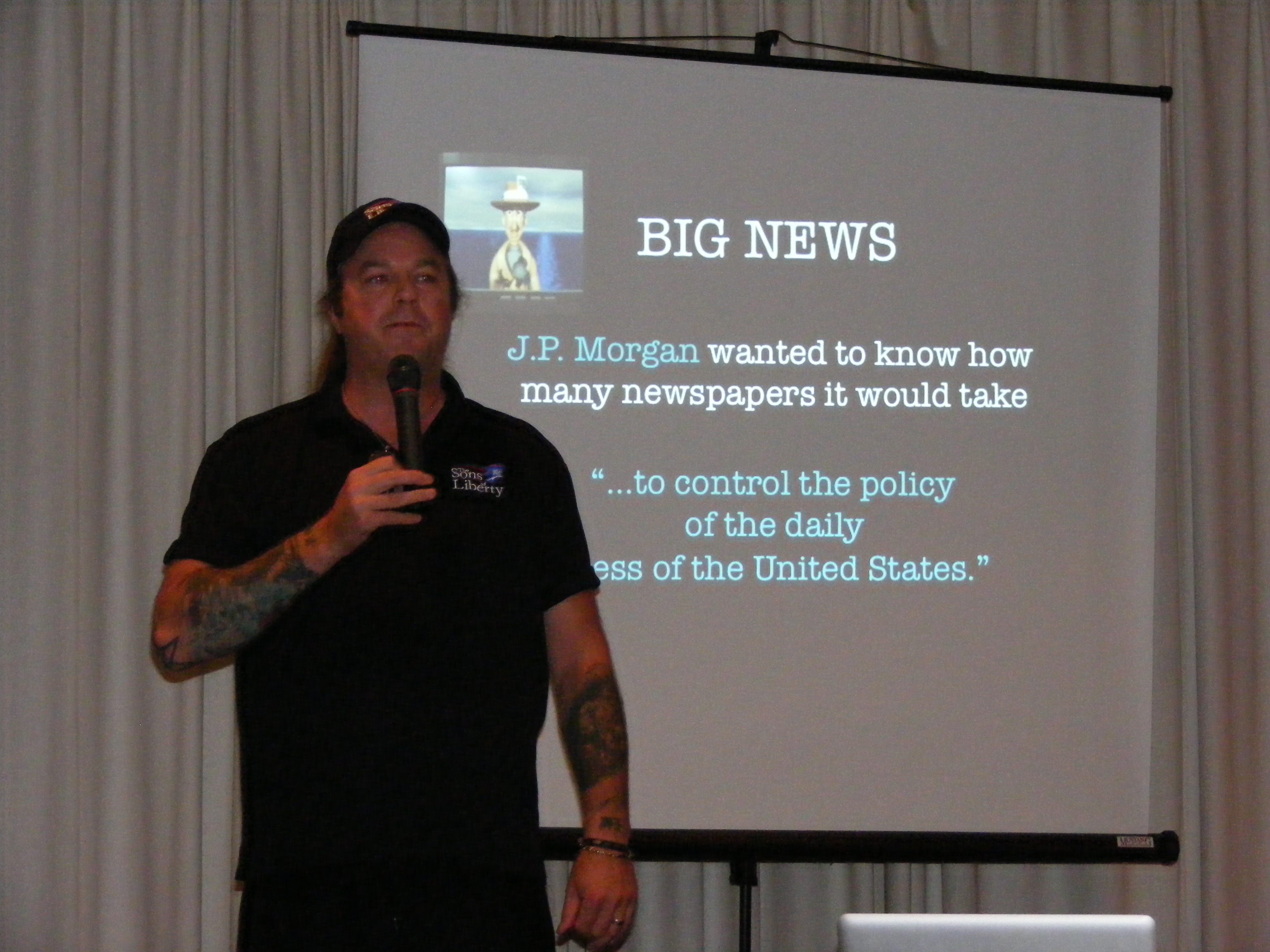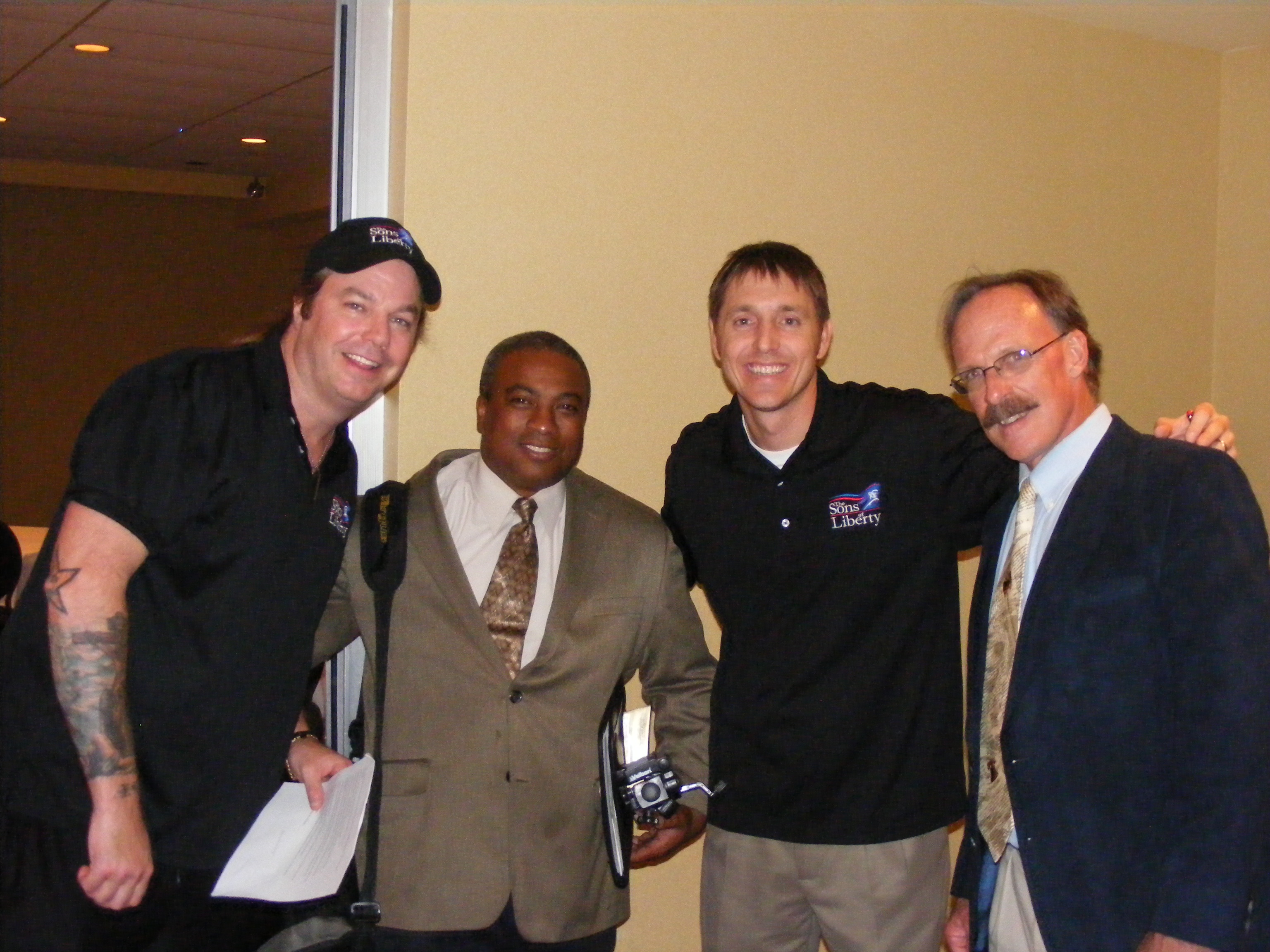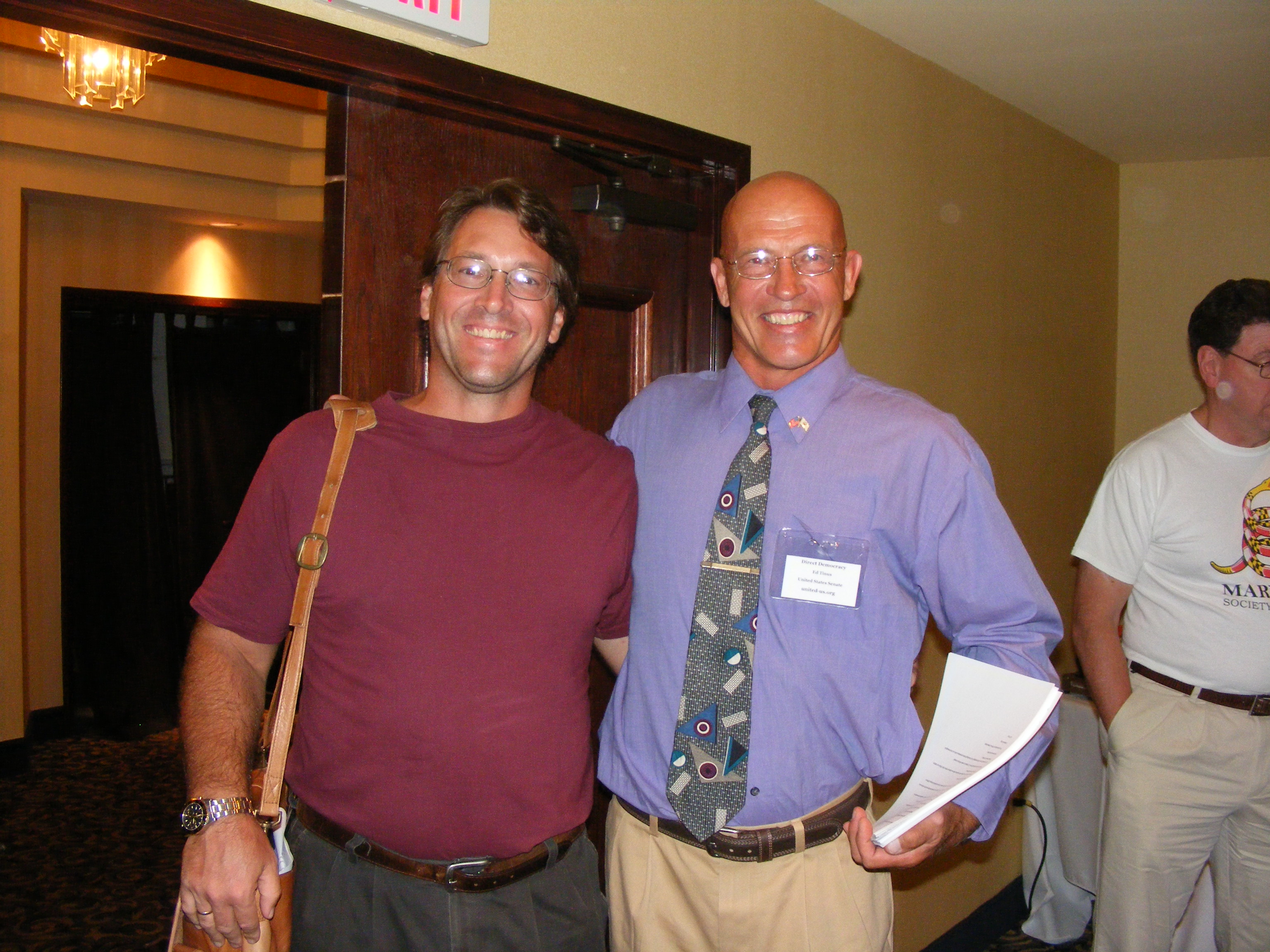Update: Rich Douglas responds to my assessment of his statement, see end of column.
We were expecting around 100 to show up, along with most of the 10 contenders for U.S. Senate and a host of local Republican elected officials. Well, two out of three ain’t bad, as Meat Loaf used to say.
I don’t have the official numbers, but I would guess our attendance were closer to 120. But we had just four U.S. Senate contenders make their way down here, with Robert Broadus showing up well before the 6 p.m. opening.

Those candidates who came had a spot to put their literature. However, we did not have a visit from Ron Paul – just local supporters.

I would say of the four Senate candidates who came, Broadus had the most stuff, with Dan Bongino and Rich Douglas bringing a more modest amount. David Jones had no literature (or support staff; he was truly a one-man operation.)
And we had a few ideas for promotion of the event, with some of the patrons taking advantage of this one.

The who’s who of local Republicans came out for the event, as well as several from around the state – included in that complement were MDGOP 1st Vice-Chair Diana Waterman and both candidates for National Committeewoman, Nicolee Ambrose and Audrey Scott.
As always, we had President Lincoln make his appearance at the event, too. He brought a small regiment of troops for protection.

There were also reenactors in each corner of the room as well as Civil War-era photographer Mathew Brady taking snapshots of the proceedings.

“Our country is in great peril now,” said President Lincoln. What I’ve found interesting each year is that the President brings the problems of 150 years ago to compare with the modern day. “In my opinion, we would do better to leave the Constitution alone,” Lincoln echoed from long ago, “It can scarcely be made better than it is.”
“My hope is that our Republic can be redeemed,” he concluded, “and that you will kick the scoundrels out.”
In speaking to Lincoln beforehand, he remarked that the portrayal gets a little easier every year because he’s getting more wrinkled. But he does a good job in setting the mood each year.

And this guy does a good job in setting up the affair each year. As always, sporting the red (naturally) blazer, Wicomico County GOP Chair Dave Parker set up the rest of the program.
As it turned out, we had a total of eight featured speakers; four Senate candidates and four state elected officials. We also heard briefly in between from Mark McIver, who is the Lower Shore liaison for Andy Harris. Andy could not attend our dinner this year.
Each Senate candidate was given about seven to eight minutes to speak, while local officials were allotted five. Now one would think that having the Senate candidates speak first, before the local officials, would be a mistake, but I didn’t see anyone heading for the exits before the benediction to close the proceedings (from Wicomico Central Committee member Dave Goslee, Sr., who also did the invocation.)

Dan Bongino had eight minutes but took five to deliver an uplifting message that “Maryland is not a lost cause.” He was quite feisty, as a matter of fact, telling those assembled that “it’s time to pick a fight…this is our home.” The statists have no entitlement to the state, he added.
While he didn’t get into many policy specifics, Dan said that conservative ideas have won before, citing Ronald Reagan’s re-election. (George H.W. Bush also carried Maryland in 1988.) What we need is a “clear delineation” on the issues, said Dan, and if we can get that “we can win this.”
And when all his friends told him he should move to Virginia from New York, Dan instead chose Maryland because “I saw Maryland first and I fell in love with it.” Now he’s made it home.

Robert Broadus was in the Navy. When he got out, he “saw a government that was not following its charter, the Constitution.” Furthermore, his representatives were “unresponsive” and weren’t listening. So he became involved and aware.
While he was “raised to vote Democrat” by virtue of his skin color, Broadus asserted that, in Maryland, “too many vote their identity” and we need to change the narrative of Republicans as rich and white – after all, President Lincoln helped end slavery as the first Republican president.
Yet the NAACP, supposedly an advocate for his race, instead supports things like illegal immigration and same-sex marriage, he continued. And when Ben Cardin came to Prince George’s County to announce his support of Obamacare, backed by the purple shirts of the SEIU, everyone – even the Republicans – was applauding. But he wasn’t.
“I stood up to Ben Cardin two years ago,” said Broadus, and “we can’t let that destruction of liberty continue.” His agenda was simple: repeal Obamacare, end the IRS, and protect marriage. The state should stop pushing a social agenda.
Broadus has run for Congress twice before, but is perhaps best known in Maryland as an advocate for protecting the concept of marriage between one man and one woman – a value system most in the room agreed with wholeheartedly.

I found it quite telling that Rich Douglas brought a book with him; a book I had a blurry picture of, unfortunately. The tome contains the rules of the U.S. Senate, and this dogeared volume was several hundred pages thick.
And while the last attack on the Bill of Rights was at Fort Sumter under President Lincoln, Douglas opined, this White House has also attacked the Bill of Rights as well. But Rich’s task of the evening was “to persuade you I am the right candidate to defeat Ben Cardin.”
He attacked the incumbent on three levels. First of all, the Senate has a lot of input on national security, but Douglas was “alarmed” by the lack of military veterans in the Senate. Bolstering his credentials in that respect was his endorsement by former U.N. Ambassador John Bolton.
Secondly – and this is a point he’s made frequently – Ben Cardin has never worked in our private-sector economy. He’s been an elected official since 1966, fresh out of law school. Someone who understands the private sector may have convinced Caterpillar to bring its new plant and 1400 jobs to Maryland – Douglas “would’ve camped out at the front door of Caterpillar” to bring the jobs here. (Imagine that in Salisbury.)
But most important was “backbone.” Douglas worked for the late Senator Jesse Helms, and Helms had principles, said Douglas. But Maryland has no Senate representation because Senate Majority Leader Harry Reid’s priorities are “high priorities” for Cardin. That’s why we have spent nuclear rods in the open at Calvert Cliffs instead of at Nevada’s Yucca Mountain, Douglas said.
As I noted about the Senate rules book, another advantage Rich claimed was knowing how the Senate rules work and using them to our advantage.
But perhaps the most controversial thing Douglas said was that the “only good conservative outcome” of the Supreme Court battle over Obamacare was that it be upheld. Congress has greater discretion under the Commerce Clause, he argued.
It was interesting that after the event was over he and Robert Broadus were having a friendly debate over that very subject.

David Jones actually spoke the longest of the four candidates. Now it’s obvious that, at just 32 years of age, he doesn’t have the pedigree the others do so that wasn’t his message.
Jones is a working man, who makes $32,000 a year and is the single dad of a four year old son. He conceded that it’s “damn near impossible” to run and win as a 32 year old Republican in Maryland.
But then again, Bob Ehrlich won in 2002. Of course, part of that was the fact that Kathleen Kennedy Townsend was an “insult to the people of the state” and Ehrlich was a “good leader.” But Martin O’Malley didn’t insult the Democrats so he won. Republicans have to “speak for all,” Jones added.
David jumped into the race because he believes “nothing is being done for the majority of the country…I’m tired of it.” And those people he encounters as part of his job “don’t believe it works anymore” either. The people need leadership, Jones believed.
But while he certainly played the role of a disaffected youth well, I never heard exactly what he stands for. Certainly he’s a likable guy, and he asked the bartenders afterward what they thought of his remarks, but I’m curious whether he can flesh out a platform next week at a Worcester County candidate forum he’s planning on attending.

After going over a list of his upcoming fundraisers, State Senator Rich Colburn announced he now officially represented about 49,000 of Wicomico County’s residents thanks to redistricting. The Democrat majority didn’t look at any alternative redistricting bills in the first 45 days of the session.
Instead, to keep up with potential 2016 Presidential rival Gov. Andrew Cuomo of New York, Martin O’Malley’s top priority was getting same-sex marriage passed, Colburn said. This prospect even affected the timing of his State of the State address, which was late because they “needed him here” rather than out traveling the country.
And apparently the new definition of millionaire was someone who made $150,000, since those who make that amount would begin losing tax deductions. Throw in the proposed gas tax, the septic bill – a “feelgood bill by the Chesapeake Bay Foundation” which won’t address the bulk of the problem – and the flush tax, and there’s a lot of damage which can yet be done in this session.
Colburn saved the last part of his enmity for the Waterkeepers Alliance, a group which is suing the Hudson family of Worcester County with assistance from the University of Maryland Law School. Colburn noted “North Carolina would love to have” our poultry industry and “every farm (in the country) is jeopardized” by the Waterkeepers’ efforts. Rich has a bill pending which would compel the University of Maryland Law School to reimburse the Hudsons $500,000 for damages. “I will continue to fight against the injustices of the University of Maryland Law School,” he vowed.

After she sang ‘God Bless America’ as part of the opening festivities, Delegate Addie Eckardt returned to the microphone to give a more sobering report, although she was “excited to see friendly faces.”
Republicans in Annapolis were “working very diligently for a way to offer an alternative budget proposal” as they have for several years now. All we need to do is “take a break” and let the revenues catch up, she assessed.
But when entities are coming up and asking for huge increases in the capital budget – which is paid for mostly from property taxes and proceeds from bond sales – she was “concerned (about) how we’ll survive.”
“There needs to be discipline in spending,” she concluded.

But while Eckardt and Colburn were rather subdued in their remarks, Delegate Mike McDermott had the delivery and cadence of a Pentecostal preacher during Sunday service. When reminded of the five minute limit, McDermott quipped “I don’t listen to the Speaker of the House, I certainly can’t listen to you.”
“We need to re-adopt the founding principles of the Declaration of Independence,” Mike thundered, as “liberty is a gift from God.” He believed that “your enemy (in Annapolis) has overreached…when (they) have to pray to God to get 71 votes.”
But all over the state, “people are infuriated with the overreach of government,” Mike continued. “They fear the people.”
Candidates for office this year need to tie themselves to the two referendum efforts going on. McDermott cited a poll taken which showed 96% of Marylanders thought they paid too much in taxes, which was awfully coincidental with the 96% of transportation money going to serve the 4% of the state which actually rides mass transit, while our roads and bridges crumble.
He also announced that Friday they saved the state $100 million. Well, they are on their way as two bills Mike sponsored are winding their way through the House. He singled out Wicomico County State’s Attorney Matt Maciarello for his help on HB112.
And because of this overreach by the other side, Mike concluded, we can divide and conquer the opposition. Then we can wistfully look back and tell our grandchildren about the time Maryland was a one-party state. In the meantime, it’s time to “take back our state.”

And poor Charles Otto. He drew the short straw of following McDermott, saying “we may as well pass the plate right now” but on the other hand he would be the last word.
In his typical low-key style, Charles implored us to get the vote out since we have a “so-called leader in the White House that needs to be replaced.” As part of that GOTV effort, Otto encouraged us to check in often at mdpetitions.com and work to get the same-sex issue on the ballot. Our GOP delegation “represents the values we grew up with,” Otto said.

But he also noted one thing the previous speakers didn’t bring up – the possible upcoming shift in state pension obligations to the counties. Charles claimed that, for Wicomico County, it would be a $4 million hit and taxes would almost certainly need to be raised locally. (As I recall, each penny increase in the property tax per $100 of assessed valuation equals about $750,000 to the county. So it would mean about a nickel’s increase.)
Yet maybe, concluded Charles, the opposition party which has already spent a lot of political capital on passing same-sex marriage will be fiscally responsible.
I’m not going to hold my breath on that myself.
It’s worth mentioning in closing that I had the chance to speak at some length with Nicolee Ambrose – not necessarily about her run for National Committeewoman but about the political scene in general. Now I agree with some things regarding the two who seek the post and I disagree with some. I haven’t made up my mind yet but speaking with Nicolee helped to lean me in a particular direction. To be fair, I also spoke more briefly with Audrey Scott before the event.
Early on Saturday, I wasn’t sure how we were going to pull this off. We had no idea how many Senate candidates would come and the person who originally was supposed to do our sound had to work. But the event turned out to be a success thanks to my cohorts on the WCRCC and all who attended. We’ll review this edition when we next meet and start working on a bigger and better one for 2013!
Update: Rich Douglas’s campaign communications director Jim Pettit sent me the following from the candidate:
Monoblogue provides a vital service for all Marylander’s, namely, covering important political events that mainstream media often misses.
Such was the case in the February 27 coverage of the Wicomoco County Lincoln Day Dinner.
I was quoted about the Supreme Court and its relationship to Congress. Let me elaborate.
Information is power. The Constitution’s Commerce Clause says Congress has the power to regulate commerce between the several states. In the courts, President Obama cited Congress’s Commerce Clause power as the authority for the insurance mandate. Over the decades, the US Supreme Court (including Marylander Robert Brooke Taney) has held that Congress has significant leeway to regulate commerce under the the Commerce Clause. So on Obamacare, the main question for the US Supreme Court is likely to be: is Obamacare a proper exercise by Congress of its power under the Commerce Clause? At this point in our logic-walk, it is vital to remember a fundamental principle of conservative judicial thought: Courts should not substitute their will for the will of the legislature. And please: don’t take my word for this — read Judge Robert Bork. My point at Salisbury was that the conservative wing of the Supreme Court (assuming that they, too, believe what Robert Bork believes) should not be expected to substitute their will for Congress’s will unless they find that Congress clearly violated the Commerce Clause with Obamacare. I’m not sure they will do this. To put it another way: if the Court is NOT offended by this ‘new’ Commerce Clause power asserted in Obamacare, and in keeping with Bork’s philosophy, the mandate will be upheld.
This tosses the hot potato back to Congress. For men like Bork, that’s where it belongs in the first place. I think this is what will probably happen. Here’s my Salisbury point: I don’t count on the Supreme Court to save our bacon. So Maryland will need a Senator who has the guts to take the hard votes on Obamacare after January 2013. Now here’s a new point: Maryland also needs a Senator who genuinely understands the Constitution, who understands how it has been interpreted, and who has taken the time to explore and understand conservative judicial philosophy before talking about it.
As a Senator I will vote to repeal Obamacare.
R. Douglas
US Senate Candidate (R-Md).
Now, allow me to add something. As an assistant in covering the event, I recorded each candidate’s speech and took notes on what I heard last night as I compiled the post into the wee hours of the morning.
I’m going to go ahead and add links to all four Senatorial candidate speeches so you can check my work:
Just think, we paid $40 for the privilege. Of course, you may get the occasional comment or two from me.


